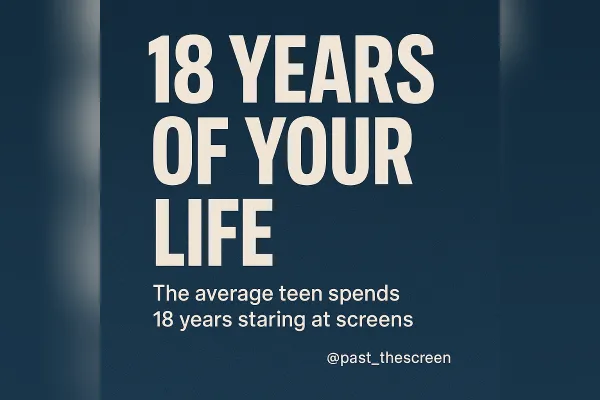
The 18-Year Wake-Up Call: Why Your Phone Is Stealing Your Life (And What You Can Do About It)
Picture this: You're 18 years old with your whole life ahead of you. You have dreams, goals, relationships to build, skills to develop. Now imagine someone told you that you're about to spend the next 18 years of your life staring at a screen, scrolling through endless feeds of content you'll forget within minutes.
Sounds dystopian? It's not fiction—it's math.
The Reality Check That Changes Everything
The average teen spends 7 hours and 22 minutes daily on their screens. Let's break that down:
7.4 hours per day = 2,701 hours per year
Over a 75-year lifespan = 175,815 hours of your life
That equals over 18 entire years spent staring at screens
TIME GONE FOREVER.

When we share this statistic with students, the room goes silent. Eighteen years—more time than you've been alive so far, more time than most people spend at their dream job, more time than you'll spend with your grandparents.
But here's what really gets us: it doesn't have to be this way.
Hi, We're Past the Screen
We're not here to shame you about your phone use or tell you technology is evil. We're here because we believe life is lived past the screen—and we want to help you reclaim the time that's rightfully yours.
Past the Screen started because we saw something troubling: incredibly bright, talented teens feeling anxious, distracted, and somehow empty despite being more "connected" than ever. We realized that the same devices meant to bring us together were often pulling us away from what matters most—real relationships, personal growth, and genuine fulfillment.
The Problem Isn't Just Time (It's Your Brain)
Here's something most people don't realize: social media apps are literally designed to be addictive. Every scroll, like, and notification triggers a release of dopamine—the same brain chemical involved in gambling, eating, and other reward-based behaviors.
You're not weak for struggling to put your phone down. You're human, and you're fighting against billion-dollar algorithms designed to capture your attention.
But once you understand how this works, you can start to take control.
Introducing the MAP Method: Your 3-Step System to Digital Freedom

After working with hundreds of students, we've developed a simple but powerful approach we call MAP:
M - Measure
Identify your digital habits and time drains
Check your Screen Time settings right now (seriously, do it)
Which apps consume most of your time?
How many hours are slipping away daily?
Which apps trigger mindless scrolling?
A - Assess
Evaluate the impact on your life and goals
Are these habits adding value or draining energy?
What are you sacrificing for screen time?
What could you be doing instead?
Be brutally honest with yourself
P - Progress
Take action with graduated steps toward change
We don't believe in going cold turkey (that usually backfires). Instead, try these 4 levels of progress:
Level 1: Swap Locations - Move beneficial apps (Books, Health, etc.) to your home screen where time-wasting apps currently live
Level 2: Remove from Home Screen - Hide problematic apps in folders or delete them from your home screen to add friction
Level 3: Offload Apps - Temporarily remove apps while keeping your data—perfect for taking breaks
Level 4: Delete Completely - Full commitment to change by permanently removing the app
Why This Actually Works
The MAP method isn't about perfection—it's about progress. We encourage you to move back and forth through the steps like a board game. Some days you might be ready for Level 4, other days you might need to go back to Level 1. That's completely normal.
Real student quote: "I deleted TikTok for finals week and actually felt way less anxious. I didn't realize how much it was affecting my mood until it was gone."
5 Simple Rules for MAP Success
Start Small - Begin with your most problematic app, not all apps at once
Replace, Don't Just Remove - Fill the void with positive activities like reading or exercise
Track Your Progress - Monitor your reduced screen time weekly
Be Patient with Yourself - Habits take 21–66 days to change
Celebrate Small Wins - Every minute reclaimed is a victory
What Students Are Saying
"73% of our students report replacing hours of scrolling with reading and family time"
"I didn't realize how much time I was wasting until I actually measured it. The visual of 18 years was shocking."
"The best part isn't just using my phone less—it's feeling more present when I'm with friends."
Your Challenge This Week
Ready to start your own MAP journey? Here's a simple challenge:
Check your Screen Time right now and identify your top 3 most-used apps
Pick ONE app that you know is more draining than beneficial
Try Level 1: Swap its home screen location with a positive app for just 24 hours
Notice how you feel - more focused? Less anxious? More present?
That's it. No pressure, no judgment. Just awareness and one small step.
What's Next?
This is just the beginning. Over the coming weeks, we'll be sharing:
Deep dives into the science of dopamine and social media
Real stories from students who've transformed their relationship with technology
Practical reviews of apps that help (and hurt) your digital wellness
Tips for having conversations with friends and family about screen time
We'll also be sharing resources, research, and strategies to help you not just use your phone less, but live your life more fully.
Join the Movement
Remember: You have more control than you think. Every minute you reclaim from mindless scrolling is a minute you can invest in your real life—your relationships, your dreams, your growth.
Life is lived past the screen. Let's help you get there.
Want to track your progress? Check out our free tracking spreadsheet and follow us @past_thescreen for daily inspiration and tips.
Ready to bring Past the Screen to your school? Visit pastthescreen.org/chapter to start your own chapter.